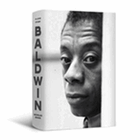
 Playwright, poet, author, and activist James Baldwin holds an unrivaled position in the history of American literature, one that biographer Nicholas Boggs thoroughly examines in Baldwin: A Love Story. As the title suggests, Boggs's work distinguishes itself from prior biographies by using Baldwin's primary romantic, platonic, artistic, and intellectual relationships as the organizing principle. Depictions of relationships with his lover, artist Lucien Happersberger, and enduring friends like Beauford Delaney breathe life into every page of the work.
Playwright, poet, author, and activist James Baldwin holds an unrivaled position in the history of American literature, one that biographer Nicholas Boggs thoroughly examines in Baldwin: A Love Story. As the title suggests, Boggs's work distinguishes itself from prior biographies by using Baldwin's primary romantic, platonic, artistic, and intellectual relationships as the organizing principle. Depictions of relationships with his lover, artist Lucien Happersberger, and enduring friends like Beauford Delaney breathe life into every page of the work.
Boggs uses new archival material and fresh interviews with people close to Baldwin throughout his life, resulting in an impressive and kaleidoscopic exploration of Baldwin's origins, his intellectual and artistic evolution, and the ever-expanding ripples of his influence across tumultuous artistic and political landscapes.
At more than 600 pages, Baldwin provides a deep intimacy into his life, delving into his formative years in Harlem. Boggs depicts his family's poverty, the fraught relationship with his stepfather, and the intellectual awakening encouraged by teachers and mentors who recognized his promise.
Boggs meticulously charts Baldwin's early literary efforts, the formation of his unmistakable voice and how he would "transmute his psychological and emotional wounds into writing." Baldwin's words developed enough force to cut through the noise of the fraught American racial discourse of the 1950s and '60s with unparalleled clarity and moral authority.
Boggs shows Baldwin's impact, not only as a novelist and essayist of breathtaking power but also as a crucial voice in the Civil Rights movement. In one anecdote, Baldwin meets with Robert Kennedy in a legendarily tense confrontation packed with celebrity and influential Black voices of the time, including Harry Belafonte and Lena Horne. The biography navigates Baldwin's complex interactions with political leaders and fellow activists, showcasing his unwavering commitment to justice while also revealing the personal toll of such a public life. For example, the FBI tracked the movements of him and his friends, "amassing what would balloon into a significant 1,884-page file on him that would not be closed until 1974."
Baldwin sensitively explores Baldwin's sexuality and lifelong quest for a long-term partner. Far from a footnote, his identity as a gay Black man is shown to be foundational in his understanding of otherness, of love in all its incarnations, and of societal constructs that label and diminish people.
Nicholas Boggs has undertaken a biography of immense scope and profound insight that deepens our understanding of Baldwin and his work. For longtime admirers and new discoverers alike, this is an indispensable companion to the ever-relevant legacy of James Baldwin. --Elizabeth DeNoma, executive editor, DeNoma Literary Services, Seattle, Wash.
Shelf Talker: An unrivaled homage to James Baldwin, a complex creative figure who changed American literature and thoughts about race in the 20th-century and beyond.

